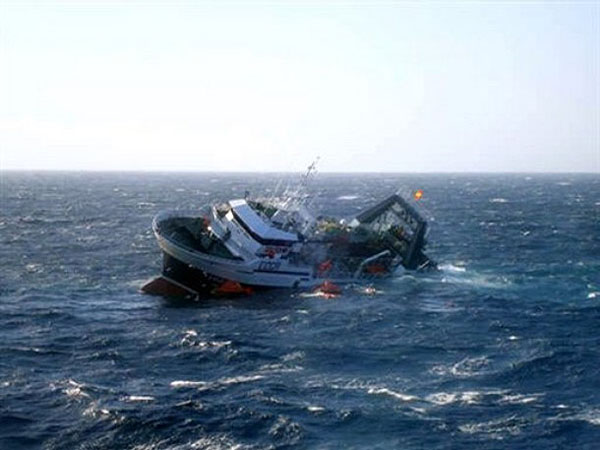“Do not be conformed to this world but be transformed by the renewing of your mind, that you may prove what the will of God is, that which is good, acceptable and perfect.” – Romans 12:2

The Spanish ship, Monte Galineiro, taking on water off the coast of Newfoundland on Sunday, February 22, 2009. The Canadian Coast Guard managed to rescue all 22 people on board the vessel before it sunk into the sea.
There’s an old saying: “The ship in the sea is alright. The sea in the ship is all wrong. The Church in the world is alright. The world in the church is all wrong.”
Everything you and I believe as Christians flies in the face of our post-modern culture. We believe in a God who has made His existence known to everyone (Romans 1:18-22) despite the strong denials of man. We believe in a God who has communicated to us in clear terms in a book called the Bible (2 Tim. 3:16, 17). We believe in absolutes, for we believe in a God who is Truth Himself, and who tells us what is right and what is wrong. We believe in the one true Gospel of Jesus Christ (Rom. 1:16, 17) who said, “I am the way, the truth and the life, no one comes to the Father but by Me.” John 14:6. We believe that the Lord Jesus Christ is the way to God and the only way to God, and we deny that He is merely a way, a truth and a life, and one of the ways to God. Understand that we do not say this because we believe our opinion is greater than someone else’s, but because Christ Himself said this about Himself, and we believe His claims are valid, trustworthy and true… We believe too that if Christ is not THE way to God, then He is a liar, and not even one of the ways to God. Jesus Christ is either who He claimed to be, or else He is a fraud, or perhaps a lunatic. But what He could never be is merely one of the ways to God. If we take His words with any seriousness at all, then we have to admit that His own claims deny this very possibility.
The claim of exclusivity is repulsive to the modern world. However, every religion claims exclusivity – even the ones who claim that all religions lead to God. Why? Because even this claim is a claim to be exclusively and absolutely true. The claim is a fundamental denial that there is only one way to God. That is the very definition of exclusivity. It certainly denies the possibility that the exclusive claims of Christ are true.
Dr. Tim Keller is correct when he writes, “Christianity is disbelieved in one culture for totally opposite reasons it is disbelieved in another. So for example, in the West… it is widely assumed that Christianity can’t be true because of the cultural belief there can’t be just one “true” religion. But in the Middle East, people have absolutely no problem with the idea that there is just one true religion. That doesn’t seem implausible at all. Rather there it is widely assumed that Christianity can’t be true because of the cultural belief that American culture, based on Christianity, is unjust and corrupt. (Skeptics ought to realize, then, that the objections they have to the Christian faith are culturally relative!) So each culture has its own set of culturally-based doubt-generators which people call ‘objections’ or ‘problems’ with Christianity. When a culture develops a combination of many, widely held defeater beliefs it becomes a cultural ‘implausibility-structure.’ In these societies, most people don’t feel they have to give Christianity a good hearing – they don’t feel that kind of energy is warranted. They know it just can’t be true. That is what makes evangelism in hostile cultures so much more difficult and complex than it was under ‘Christendom.’ In our Western culture (and in places like Japan, India, and Muslim countries) the reigning implausibility-structure against Christianity is very strong. Christianity simply looks ludicrous. In places like Africa, Latin America, and China, however, the implausibility structures are eroding fast. The widely held assumptions in the culture make Christianity look credible there.”
The claim “there are no absolutes” is also a ridiculous non-sensical statement, for it is an absolute statement in and of itself. It claims that there are absolutely no absolutes but in doing so affirms that there is at least one absolute, namely that there are no absolutes!
Romans 12:2 teaches us that our mandate as Christians is not to allow the world to squeeze us into its mould, but to be different – transformed, even metamorphosized, by renewing our minds to the will of God. To avoid the world’s mould, we must first recognize what it is, and see the pitfalls ahead of us. If we do not, we might find ourselves caught up in the thinking of the culture around us without even realizing it. We must understand what the world thinks, how it thinks and how it wants us to think. Then we need to take deliberate steps to walk not in the counsel of the wicked, nor stands in the way of sinners, nor sit in the seat of scoffers; but delight in the law of the LORD, meditating on it day and night.
Unlike those who swim with the tide of post-modernity, this type of 21st Century Christian will be “like a tree planted by streams of water that yields its fruit in its season, and its leaf does not wither. In all that he does, he prospers. The wicked are not so, but are like chaff that the wind drives away. Therefore the wicked will not stand in the judgment, nor sinners in the congregation of the righteous; for the LORD knows the way of the righteous, but the way of the wicked will perish.” (Psalm 1)
